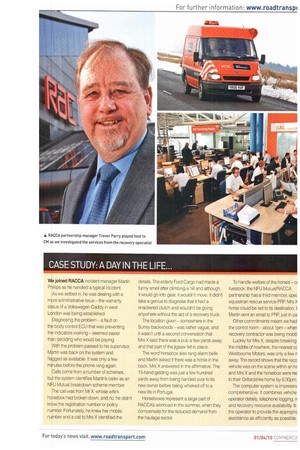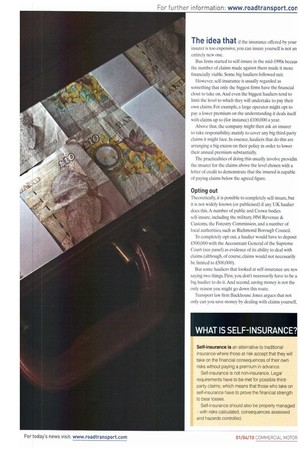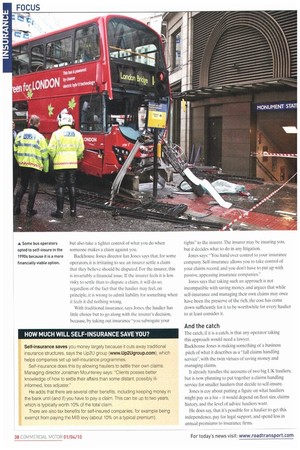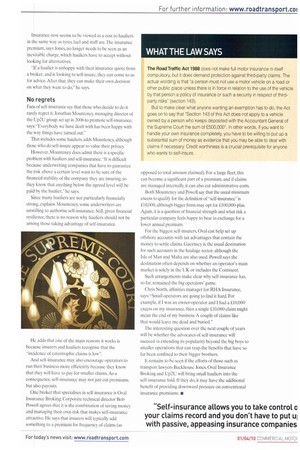CASE STUDY: A DAY IN THE LIFE...
Page 35

Page 37

Page 38

Page 39

If you've noticed an error in this article please click here to report it so we can fix it.
We joined RACCA incident manager Martin P illips as he handled a typical incident.
As we settled in, he was dealing with a m re administrative issue the warranty sti tus of a Volkswagen Caddy in west London was being established.
Diagnosing the problem a fault on the body control ECU that was preventing the indicators working seemed easier than deciding who would be paying.
With the problem passed to his supervisor. Martin was back on the system and flagged as available. It was only a few minutes before the phone rang again.
Calls come from a number of schemes, but the system identifies Martin's caller as an NFU Mutual breakdown scheme member.
The call was from Mr X, whose wife's horsebox had broken down, and no, he didn't know the registration number or policy amber. Fortunately, he knew her mobile number and a call to Mrs X identified the details. The elderly Ford Cargo had made a funny smell after climbing a hill and although it would go into gear, it wouldn't move. It didn't take a genius to diagnose that it had a knackered clutch and wouldn't be going anywhere without the aid of a recovery truck.
The location given somewhere in the Surrey backwoods was rather vague, and it wasn't until a second conversation that Mrs X said there was a pub a few yards away and that part of the jigsaw fell in place.
The word horsebox also rang alarm bells and Martin asked if there was a horse in the back. Mrs X answered in the affirmative. The 15-hand gelding was just a few hundred yards away from being handed over to its new owner before being whisked off to a new life in Portugal.
Horseboxes represent a large part of RACCA's workload in the summer, when they compensate for the reduced demand from the haulage sector. To handle welfare of the horses livestock. the NFU Mutual/RACCA partnership has a third member, spec equestrian rescue service PRP Mrs X horse could be led to its destination, Martin sent an email to PAP, just in ca Other commitments meant we had the control room about 1pm when recovery contractor was being mobili Luckily for Mrs X, despite breaking the middle of nowhere, the nearest a Westbourne Motors, was only a few r away. The record shows that the recc vehicle was on the scene within an h( and Mrs X and the horsebox were re( to their Oxfordshire home by 6:30pm.
The computer system is imp ressi' comprehensive. It combines vehicle operator details, telephone logging, r and recovery resource availability. It the operator to provide the approprie assistance as efficiently as possible.
The idea that if the insurance offered by your insurer is too expensive, you can insure yourself is not an entirely new one.
Bus firms started to self-insure in the mid-1990s becaus the number of claims made against them made it more financially viable. Some big hauliers followed suit.
However, self-insurance is usually regarded as something that only the biggest firms have the financial clout to take on. And even the biggest hauliers tend to limit the level to which they will undertake to pay their own claims. For example, a large operator might opt to pay a lower premium on the understanding it deals itself with claims up to (for instance) £100,000 a year.
Above that, the company might then ask an insurer to take responsibility, mainly to cover any big third-party claims it might face. In essence, hauliers that do this are arranging a big excess on their policy in order to lower their annual premium substantially.
The practicalities of doing this usually involve providin the insurer for the claims above the level chosen with a letter of credit to demonstrate that the insured is capable of paying claims below the agreed figure.
Opting out
Theoretically, it is possible to completely self-insure, but it is not widely known (or publicised) if any UK haulier does this. A number of public and Crown bodies self-insure, including the military. HM Revenue & Customs, the Forestry Commission, and a number of local authorities, such as Richmond Borough Council.
To completely opt out, a haulier would have to deposit £500,000 with the Accountant General of the Supreme Court (see panel) as evidence of its ability to deal with claims (although, of course, claims would not necessarily be limited to £500,000).
But some hauliers that looked at self-insurance are nos saying two things. First, you don't necessarily have to be a big haulier to do it. And second, saving money is not the only reason you might go down this route.
Transport law firm Backhouse Jones argues that not only can you save money by dealing with claims yourself, hut also take a tighter control of what you do when someone makes a claim against you.
Backhouse Jones director Ian Jones says that, for some operators. it is irritating to see an insurer settle a claim that they believe should be disputed. For the insurer, this is invariably a financial issue. If the insurer feels it is less risky to settle than to dispute a claim, it will do so, regardless of the fact that the haulier may feel, on principle, it is wrong to admit liability for something when it feels it did nothing wrong.
With traditional insurance, says Jones. the haulier has little choice but to go along with the insurer's decision, because, by taking out insurance -you subrogate your rights" to the insurer. The insurer may be insuring you, but it decides what to do in any litigation.
Jones says: "You hand over control to your insurance company Self-insurance allows you to take control of your claims record. and you don't have to put up with passive, appeasing insurance companies."
Jones says that taking such an approach is not incompatible with saving money. and argues that while self-insurance and managing their own claims may once have been the preserve of the rich, the cost has come down sufficiently for it to be worthwhile for every haulier to at least consider it.
And the catch
The catch, if it is a catch, is that any operator taking this approach would need a lawyer.
Backhouse Jones is making something of a business pitch of what it describes as a "full claims handling service", with the twin virtues of saving money and managing claims.
It already handles the accounts of two big UK hauliers, but is now planning to put together a claims handling service for smaller hauliers that decide to self-insure.
Jones is coy about putting a figure on what hauliers might pay as a fee it would depend on fleet size, claims history. and the level of advice hauliers want.
He does say, that it's possible for a haulier to get this independence, pay for legal support, and spend less in annual premiums to insurance firms.
Insurance now seems to be viewed as a cost to hauliers in the same way as tyres. fuel and staff are. The insurance premium, says Jones, no longer needs to be seen as an inevitable charge, which hauliers have to accept without looking for alternatives.
"If a haulier is unhappy with their insurance quote from a broker, and is looking to self-insure, they can come to us for advice. After that, they can make their own decision on what they want to do," he says
No regrets
Fans of self-insurance say that those who decide to do it rarely regret it. Jonathan Mounteney. managing director of the Up2U group. set up in 2006 to promote self-insurance. says: "Everybody we have dealt with has been happy with the way things have turned out."
That includes some hauliers, adds Mounteney, although those who do self-insure appear to value their privacy.
However. Mounteney does admit there is a specific problem with hauliers and self-insurance. "It is difficult because underwriting companies that have to guarantee the risk above a certain level want to be sure of the financial stability of the company they are insuring, so they know that anything below the agreed level will be paid by the haulier," he says.
Since many hauliers are not particularly financially strong, explains Mounteney, some underwriters are unwilling to authorise self-insurance. Still, given financial resilience, there is no reason why hauliers should not be among those taking advantage of self-insurance.
He adds that one of the main reasons it works is because insurers and hauliers recognise that the "incidence of catastrophic claims is low".
And self-insurance may also encourage operators to run their business more efficiently because they know that they will have to pay for smaller claims. As a consequence. self-insurance may not just cut premiums. but also payouts.
One broker that specialises in self-insurance is Oval Insurance Broking. Corporate technical director Bob Powell agrees that it is the combination of saving money and managing their own risk that makes self-insurance attractive. He says that insurers will typically add something to a premium for frequency of claims (as opposed to total amount claimed). For a large fleet, this can become a significant part of a premium, and if claims are managed internally, it can also cut administrative costs Both Mounteney and Powell say that the usual minimum excess to qualify for the definition of "self-insurance" is £10,000. although bigger firms may opt for £100,000-plus. Again, it is a question of financial strength and what risk a particular company feels happy to bear in exchange for a lower annual premium.
For the biggest self-insurers, Oval can help set up offshore accounts with tax advantages that contain the money to settle claims. Guernsey is the usual destination for such accounts in the haulage sector. although the Isle of Man and Malta are also used. Powell says the destination often depends on whether an operator's main market is solely in the UK or includes the Continent.
Such arrangements make clear why self-insurance has, so far, remained the big operators' game.
Chris North. affinities manager for RHA Insurance, says: "Small operators are going to find it hard. For example, if I was an owner-operator and I had a£10,000 excess on my insurance, then a single £10,000 claim might mean the end of my business. A couple of claims like that would leave me dead and buried."
The interesting question over the next couple of years will be whether the advocates of self-insurance will succeed in extending its popularity beyond the big boys to smaller operations that can reap the benefits that have so far been confined to their bigger brothers It remains to be seen if the efforts of those such as transport lawyers Backhouse Jones, Oval Insurance Broking and Una! will bring small hauliers into the self-insurance fold. If they do, it may have the additional benefit of providing downward pressure on conventional insurance premiums. •






























































































































































































